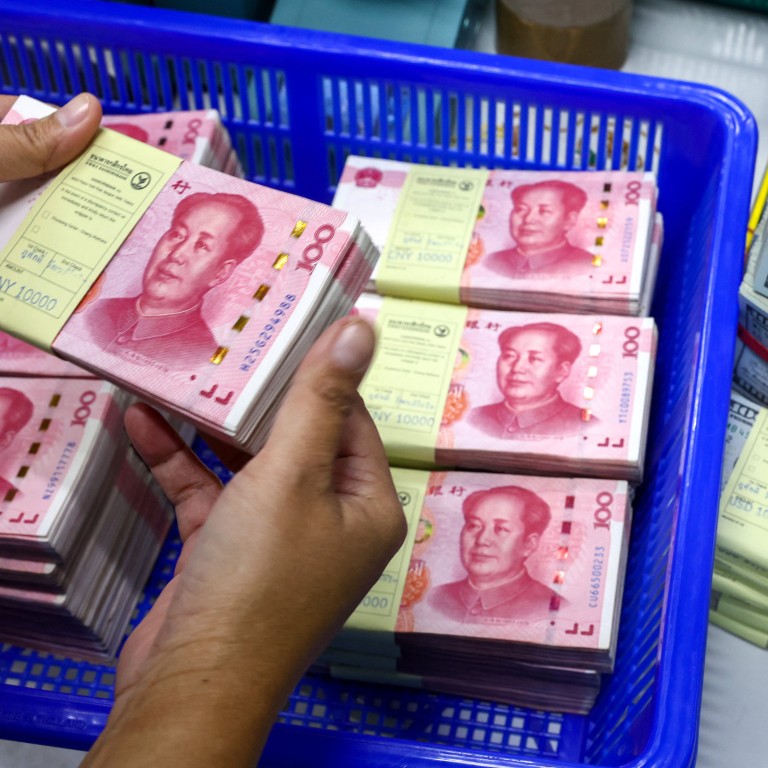
Will China weaponise the yuan?
Intentionally weakening the yuan would be a boon for cheaper Chinese exports, but on the whole, a devalued yuan could make China’s problems much worse.
Institute of International Finance warns of capital-flight risks if the yuan continues to depreciate, and says this simply ‘isn’t an option as a cyclical stimulus tool’.
Beijing could – if it really wanted to – drastically devalue China’s yuan to prop up the nation’s exports. Or at least that’s what the market fears.
But the global association of the financial industry says China’s leadership is unlikely to utilise such a seismic option, even as the world’s second-largest economy has been labouring to reverse a persistent downturn.
China’s yuan has depreciated steadily since February, driven by the faltering post-pandemic economy and widening yield gap with other economies such as the US, as well as dampening capital flows and trade. And the need to counter such pressures and stay competitive has helped fuel concerns that China could “weaponise” the yuan’s exchange rate, as a weakened yuan would make Chinese exports cheaper, boosting international sales.
And the need to counter such pressures and stay competitive has helped fuel concerns that China could “weaponise” the yuan’s exchange rate, as a weakened yuan would make Chinese exports cheaper, boosting international sales.
But the Institute of International Finance (IIF) says that such a move by Beijing would be counterproductive, as it would intensify capital flight.
In a report on Thursday, the IIF pointed to China’s previous yuan devaluations, in 2015 and 2016, saying that rather than boost growth, the moves prompted an exodus of cash and assets, and that this served to tighten financial conditions and add to the growing headwinds.
“Given abundant liquidity and sizeable debt overhang, the potential for capital flight is still very much alive, so that devaluation – almost a decade later – still isn’t an option as a cyclical stimulus tool,” the IIF said.
Instead, it added, domestic easing will be sufficient for China to maintain steady growth.
Michael Pettis, a finance professor at Peking University’s Guanghua School of Management, said a weaker yuan may not be beneficial to China, which runs a large trade surplus with the rest of the world. Instead, he said, a weaker yuan may even reduce China’s already-subdued domestic demand.
“A weaker yuan makes China’s problems worse,” Pettis said. “I think Beijing is trying to keep the currency as steady as possible.”
However, he also noted that Beijing faces a balancing act in keeping the yuan stable against the US dollar, which is strengthening, while minimising the yuan’s instability against a basket of other major currencies.“Either one creates certain benefits and certain problems, so they have to choose between those two,” Pettis added. “It’s going to be an issue for a while.”
To support China’s economic recovery, Beijing has been introducing various easing measures over the past few weeks to promote credit growth.
The People’s Bank of China (PBOC) on Friday cut banks’ reserve requirement ratio – the amount of cash that banks must hold as reserves – by 25 basis points, in a move that could free up as much as 500 billion yuan (US$69 billion), by some estimates.
In its quarterly monetary policy report in August, the PBOC pledged to “actively and steadily respond” to depreciation pressure on the yuan.
The PBOC has previously said it would not engage in “competitive devaluation”, following complaints from the US and other countries that China gets an unfair trade advantage by deliberately keeping the yuan weak.
Guan Tao, global chief economist with Bank of China International and a former director with the State Administration of Foreign Exchange, said markets should not assume the yuan will enter into a free fall as a result of recent weakness.
“The central bank may not react to daily volatility in the yuan exchange rate,” Guan said last week in an interview with Yicai, a Shanghai-based state media group. “But if the volatility affects financial stability and price stability, it should react.”







No comments:
Post a Comment
Note: Only a member of this blog may post a comment.